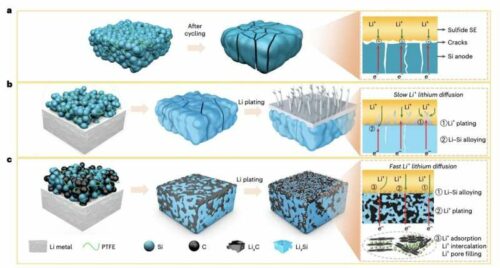Chinese researchers develop Li-Si anodes, improving performance and safety, unlocking the potential for commercialization and widespread adoption.

Many studies focus on all-solid-state batteries (ASSBs) due to their potential for improved safety and power density compared to liquid or polymer-based batteries. Sulphide solid electrolytes and lithium metal anodes are a promising combination for ASSBs. However, Li metal anodes can degrade during operation due to dendrite growth and chemical reactions.
Researchers at the Tianmu Lake Institute of Advanced Energy Storage Technologies, the Chinese Academy of Sciences, and other institutes in China have developed Li-Si anodes to enhance the performance of ASSBs, minimising the potential for failure. Li and Si anodes in ASSBs offer high energy density and improved safety. Yet, Li anodes face dendrite growth, while Si anodes undergo volume expansion.
The synthesis involves creating a hard carbon-stabilised Li-Si alloy anode. Si sintering transforms particles into a dense continuum, forming a 3D network with ionic and electronic conductivity. This enlarges the active area, reducing stress concentration and improving kinetics and stability. The researchers have developed their anode by subjecting a Si-contained film and Li foil to a press-induced reaction. They subsequently conducted simulations and experiments to evaluate its performance. The anode was integrated into cells with one of two cathodes and an electrolyte utilising Li6PS5Cl.
The team reported that full cells incorporating the hard-carbon-stabilised Li-Si anode and LiCoO2 or LiNi0.8Co0.1Mn0.1O2 cathodes and Li6PS5Cl electrolyte exhibit favourable rate capability and cycle stability. Remarkably, the ASSB utilising LiNi0.8Co0.1Mn0.1O2 cathode with a high loading of 5.86 mAh cm−2 achieves 5,000 cycles at 1 C (5.86 mA cm−2), highlighting the potential for practical implementation of hard-carbon-stabilised Li-Si alloy anodes in ASSBs. Preliminary tests of the carbon-stabilised Li-Si anode have showcased impressive performance. It effectively inhibited dendrite growth and enhanced the current density of ASSBs. Furthermore, it demonstrated greater stability and improved electrochemical performance compared to previously introduced solid material-based anodes.
This study and its new anode could inspire promising components for ASSBs, contributing to their commercialization and enabling widespread adoption of electric vehicles and advanced technologies.
Reference: Wenlin Yan et al, Hard-carbon-stabilized Li–Si anodes for high-performance all-solid-state Li-ion batteries, Nature Energy (2023). DOI: 10.1038/s41560-023-01279-8






